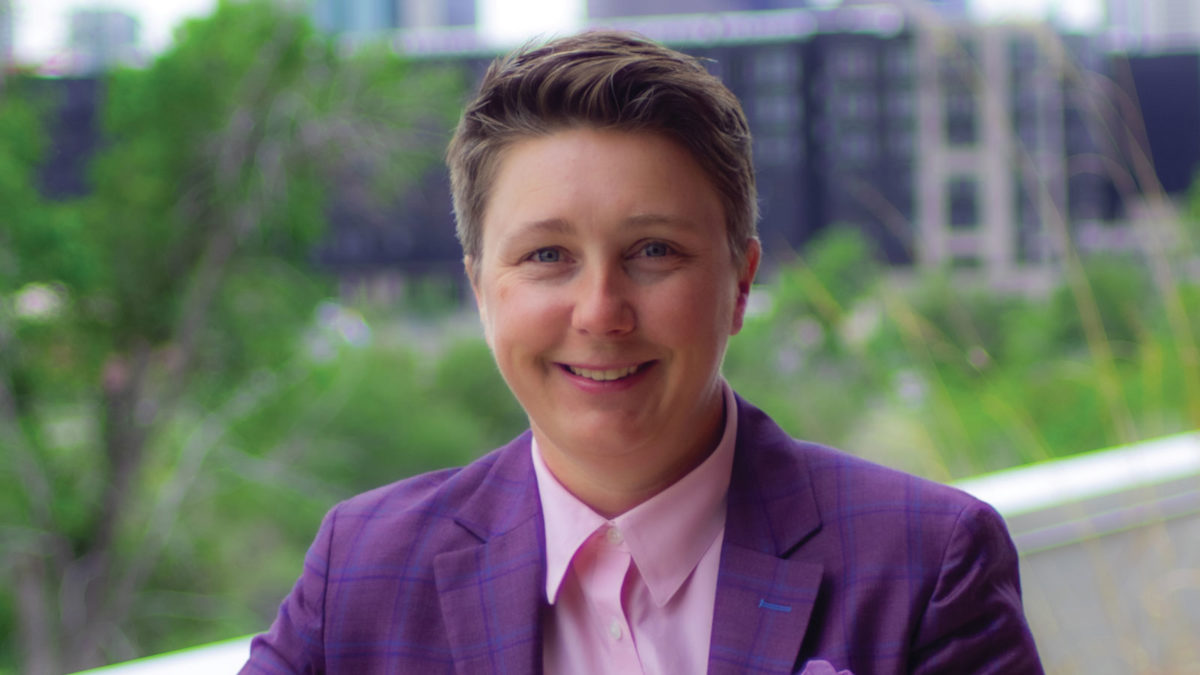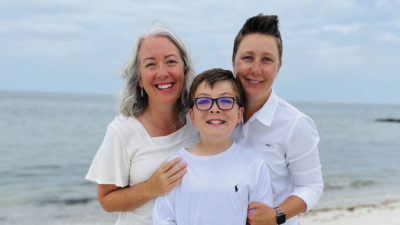
Perfectly Imperfect
Meet CBA President Ryann Peyton
July 2022
Download This Article (.pdf)
“To be honest, I never really saw myself as a leader,” Ryann Peyton says when reflecting on the journey that led them to the Colorado Bar Association presidency. “I have been told my entire life that I lack the natural extroversion and intellect to be a leader. For a long time, I believed these things about myself, so I never leaned in to leadership opportunities or took risks to cultivate those opportunities for myself.”
A self-proclaimed introvert, Peyton says they owe it to “the mentors and sponsors in my life who not only modeled what different leadership styles can look like, but also took me aside to say ‘you have a place at this table’ and gave me the confidence to embrace my unique leadership style. As I found opportunities to practice my leadership style within the CBA, I developed the confidence (and desire) to lead the CBA as a whole.”
Peyton says this with the caveat that they’re not sure they actually have a leadership style per se. “If anything, I would say that my leadership approach is based in authenticity. We all come to this profession and our roles within it as somewhat broken people. We all have varied childhood trauma, lived experiences, insecurities, stories and beliefs about ourselves, and attachment styles. Just because we are educated, middle-aged professionals doesn’t mean that any of that baggage gets left at the bar association door when we walk through it.
“My leadership approach is to make space for that baggage. I try to create a place where everyone can be a little bit broken and where everyone can belong. When we acknowledge the humanity in one another, we can find common ground and work through difference at a much higher level. When we acknowledge our personal insecurities and shortcomings, we can avoid the pretense that stalls innovation. When we can acknowledge and articulate our personal and collective ‘why,’ we can create almost any ‘how’ together.
“My advice for others who might also think of themselves as lacking the qualities needed to take on a bigger role is to stop trying to live someone else’s leadership journey. There is no right or wrong way to be a leader. There is only your way. You can’t force it.”
Down in the Dirt
It’s a very human approach that one would expect from someone who has based their career on helping others. It’s something they saw modeled by their grandmother. “She was a teacher by trade, but a giver by spirit. She had a keen ability to identify and connect with people in need and I watched the ways that she would engage people with humility, grace, and zeal to help them through both acute and chronic crisis. When she saw suffering or injustice, she never waved it off as someone else’s problem to solve. She knelt in the mud, got her hands dirty, and did her part to lift up her fellow human.”
As a lawyer, Peyton focused on social justice. “I took every class that sparked my interest or joy in law school because I wanted to gain a holistic legal education. I focused on determining who I wanted to help and ultimately that led me to working with underrepresented communities, focusing on civil rights and family matters.” Peyton spent their summers working with Standpoint, formerly the Battered Women’s Legal Advocacy Project (BWLAP), serving domestic and sexual violence survivors. They also worked in their law school’s elder law clinic, where they focused on serving victims of elder abuse (physical and financial). By the time they graduated, they had performed an impressive 500-plus hours of pro bono legal service.
These experiences made a lasting impression as they went into practice. “I will never forget a case in which our sole piece of evidence was a Ziploc bag of hair that had been ripped out of my client’s head as she was thrown across the room,” Peyton recalls. “I remember going through the process of authenticating this piece of evidence using the rules I had learned in my evidence class and asking my client to recount for the judge how she collected her own hair off the floor and put it in a bag because she thought no one would believe her about the abuse she was enduring. I realized in that moment how inhumane the law and the administration of justice can be. I came to see the law as over-engineered to seek truth and justice at the expense of humanity, and I vowed to myself after that case to always use my position in the legal profession to preserve the dignity and humanity of the people who access the justice system.”
Peyton was successful as a lawyer, but despite that, they hit a breaking point. “The practice of law did not make me happy, and there came a point where I was either going to lose my license, lose my marriage, or lose my life if I didn’t make a fundamental change. I was self-medicating with an unhealthy amount of alcohol, I was making questionable ethical decisions in my cases, I resented my clients, and my work was not bringing me any joy.”
They pivoted to something they had always been passionate about and had always done naturally: helping others. In 2016, they became executive director of the Colorado Attorney Mentoring Program (CAMP). “My knowledge of the profession, especially the pain points of the profession for young lawyers and lawyers from underrepresented communities, was very helpful in the transition to legal mentoring. The learning curve came in slowly taking off my litigator costume and finding myself and my strengths again in strategic visioning, program building, relationship development, and training/education.”
Taking CBA to the Next Level
And it’s this kind of strategic thinking Peyton brings to the role of president. They have ambitious, detailed goals for their term. “The CBA’s commitment to the eradication of systemic racism is a fantastic start to strengthening our commitment to diversity, inclusion, and equity. I hope to take these efforts to the next level by engaging the CBA in an emergent process to achieve true anti-racist organizational change.” Peyton has several plans to achieve this, from shifting the process to be centered on and led by those who are most impacted by racism, to engaging in and imbedding equity audits into the organization’s culture, to training CBA leaders to be anti-racist bystanders and upstanders, to creating intention in the representation of diversity through collaborative partnerships across the profession, to ensuring elements of anti-racist organizational change are incorporated into the CBA’s next strategic plan. “My goal is to assist the CBA in moving from good intentions in its anti-racism work to real action with measurable results.”
Additionally, Peyton wants a rededication to civility as the core of professionalism. “This is a passion area of mine,” they say. “It is what led me to leave traditional legal practice in favor of service to the profession through legal mentoring and professional development. The CBA has always had a voice in the ‘professionalism conversation,’ and it is time that voice was amplified and made more impactful. With the cessation of the Chief Justice’s Commission on the Legal Profession, there is presently no formal effort in Colorado to address and curb spreading incivility within the profession. I believe the CBA can step into that void and provide leadership to educate, facilitate, and innovate in this area. I’d like to reimagine the Professionalism Coordinating Council to take on a larger role both within the association and the profession as a whole to create systemic solutions to incivility. The needed rebirth of civility, at a critical juncture in the evolution of the legal profession, should be seen by the CBA and its members as a great opportunity to shape the future of law practice. The CBA has the capacity, the talent, and the platform to innovatively address incivility to promote more effective lawyering, create improved job satisfaction, and reduce attorney discipline.”
Finally, Peyton wants to put a renewed focus on access to justice and the delivery of legal services. “The COVID crisis has done little to improve access to justice and the delivery of legal services to rural and isolated communities. The CBA, as a collaborative partner with the Colorado Access to Justice Commission, is in a unique position to lead the conversation on how to address access to justice in a post-COVID world. My goal is to utilize the momentum and model of the Greater Colorado Task Force, the new Succession to Service Pro Bono Pipeline, and the CBA’s commitment to breaking down racism within the justice system to catalyze a renewed focus on the delivery of legal services specifically to rural, isolated, and underrepresented communities.”
To Broadway and Back
When they are not carrying out their big plans for the CBA, Peyton hopes they and their family can add more stamps to their passports now that COVID restrictions are loosening. “My wife Sara and I were slated to leave for Mexico for our tenth wedding anniversary the week of the original COVID shutdowns. We finally were able to take that trip this past February to celebrate our twelfth anniversary.” They were also able to travel to New York, London, and Paris for their son Archer’s 10th birthday. “It was a great trip, and we were able to see Hamilton in New York City, which was a real highlight,” says Peyton, who is a fan of Broadway shows.

Now that they’re back in Colorado, Ryann looks forward to traveling the state to visit local bar associations and getting to know the greater membership. While there may be less singing on 1290 Broadway, a year on the CBA stage still promises to be the experience of a lifetime. Please join us in welcoming Ryann as our 125th president and consider meeting them at a local bar visit near you.


